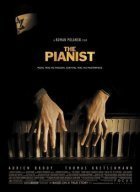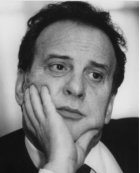
The Pianist Page #28
INT. KITCHEN, RUINED VILLA - EVENING
Dark, shadowy.
Szpilman comes down a flight of wooden stairs that had
directly into the kitchen.
Immediately, he begins to search fractically, opening
cupboards, drawers. He finds a can with a label illustrating
pickled cucumbers. Desperately, he searches for something
to open it with.
He discovers a pair of scales with a variety of weights.
He seizes one of the weights when, very close, he hears
the sound of a car coming to a halt, then the car door
slam, a German voice giving commands.
He drops the weight but, holding the tin, he scampers up
the stairs.
INT. BACK STAIRS, RUINED VILLA - EVENING
Szpilman, clutching the unopened tin, makes his way up the
narrow, wooden staircase.
INT. TOP FLOOR, RUINED VILLA - EVENING
Szpilman, panting heavily, reaches the top floor. He sees
a small door, tries it. It opens.
INT. ATTIC AND LOFT, RUINED VILLA - EVENING
Szpilman enters, closing the small door behind him. He
leans back, resting, recovering.
And then he hears from down below a piano playing a
Beethoven piece.
After a few bars, the music stops. Szpilman listens
anxiously. Silence.
He looks around, finding himself in an attic space filled
with junk, a ladder, rotting material, travelling trunks.
Last light of day filtering through a dormer window.
There's a ladder leading up to a trapdoor. Szpilman climbs
the ladder.
He crawls into a small empty space. With enormous effort
he pulls up the ladder and closes the trapdoor.
Exhausted and trying to catch his breath, he gazes at the
unopened tin. He peers through the darkness but sees
nothing.
His eyes begin to droop.
EXT. WARSAW CITY SKYLINE - NIGHT
Artillery fire. Fires glow on the horizon.
INT. LOFT, RUINED VILLA - NIGHT
Szpilman wakes suddenly. He listens. Silence but for the
distant gunfire. He sees the unopened tin of pickles, stares
at it. He opens the trapdoor.
INT. BACK STAIRS, RUINED VILLA - NIGHT
Szpilman, a shadow, a spectre, creeps down the stairs.
INT. KITCHEN, RUINED VILLA - NIGHT
Szpilman has placed the tin and the weight on a shelf and
is engrossed in searching again. He finds a pair of chicken
scissors. Using the weight, he starts to hammer the point
of the scissors into the tin making a perforation round
the rim.
The tin slips off the shelf and rolls across the floor
coming to rest at a pair of highly polished jackboots.
Szpilman stifles a gasp.
On the stairs, in silhouette, gazing down at him, the figure
of a GERMAN CAPTAIN, the thumb of one hand caught in his
belt above his pistol.
THE GERMAN CAPTAIN
(stern)
Who the hell are you?
Szpilman just stares at him.
THE GERMAN CAPTAIN
Who are you?
No response.
THE GERMAN CAPTAIN
What the hell are you doing?
SZPILMAN:
(barely audible, in
German)
I was... I was trying to open this
tin.
THE GERMAN CAPTAIN
Where do you live?
No response.
THE GERMAN CAPTAIN
What's your work?
SZPILMAN:
I am... I was a pianist.
THE GERMAN CAPTAIN
A pianist.
He studies Szpilman for a moment, then with a nod orders
him to follow. Szpilman picks up the tin and follows.
INT. ROOMS, RUINED VILLA - NIGHT
Szpilman follows the German Captain through a double door,
hanging off its hinges, into a room with a broken table in
the centre, what once was the dining room. And then through
another set of doors. The German Captain's boots echo.
They come into a spacious room. Faint moonlight filters
through the large windows. Fallen masonry and broken glass.
A couple of chairs. And a grand piano in the corner.
The German Captain points at the piano.
THE GERMAN CAPTAIN
Play.
Szpilman hesitates, then limps to the piano, puts down the
tin, and opens the lid. He turns and drags one of the chairs
over and sits.
The German Captain stands and watches.
Szpilman glances surreptitiously at his hands, and then he
plays Chopin.
The German Captain listens, expressionless. The pale
moonlight shows him to be a handsome, elegant man.
Szpilman finishes playing.
Silence.
Somewhere, a cat mews. Distant burst of rifle fire.
The German Captain stares at Szpilman. After a moment:
THE GERMAN CAPTAIN
Are you hiding here?
Szpilman nods.
THE GERMAN CAPTAIN
Jew?
Long pause. Szpilman just stares at him.
THE GERMAN CAPTAIN
Where are you hiding?
SZPILMAN:
(in German)
In the attic.
THE GERMAN CAPTAIN
Show me.
Szpilman hesitates, takes the tin and then shuffles past
the German Captain towards the door.
INT. ATTIC AND LOFT AREA, RUINED VILLA - NIGHT
Szpilman and the German Captain enter.
The German Captain takes out a flashlight, sees the ladder
in place, leading up to the loft.
Translation
Translate and read this script in other languages:
Select another language:
- - Select -
- 简体中文 (Chinese - Simplified)
- 繁體中文 (Chinese - Traditional)
- Español (Spanish)
- Esperanto (Esperanto)
- 日本語 (Japanese)
- Português (Portuguese)
- Deutsch (German)
- العربية (Arabic)
- Français (French)
- Русский (Russian)
- ಕನ್ನಡ (Kannada)
- 한국어 (Korean)
- עברית (Hebrew)
- Gaeilge (Irish)
- Українська (Ukrainian)
- اردو (Urdu)
- Magyar (Hungarian)
- मानक हिन्दी (Hindi)
- Indonesia (Indonesian)
- Italiano (Italian)
- தமிழ் (Tamil)
- Türkçe (Turkish)
- తెలుగు (Telugu)
- ภาษาไทย (Thai)
- Tiếng Việt (Vietnamese)
- Čeština (Czech)
- Polski (Polish)
- Bahasa Indonesia (Indonesian)
- Românește (Romanian)
- Nederlands (Dutch)
- Ελληνικά (Greek)
- Latinum (Latin)
- Svenska (Swedish)
- Dansk (Danish)
- Suomi (Finnish)
- فارسی (Persian)
- ייִדיש (Yiddish)
- հայերեն (Armenian)
- Norsk (Norwegian)
- English (English)
Citation
Use the citation below to add this screenplay to your bibliography:
Style:MLAChicagoAPA
"The Pianist" Scripts.com. STANDS4 LLC, 2025. Web. 16 Jan. 2025. <https://www.scripts.com/script/the_pianist_72>.



Discuss this script with the community:
Report Comment
We're doing our best to make sure our content is useful, accurate and safe.
If by any chance you spot an inappropriate comment while navigating through our website please use this form to let us know, and we'll take care of it shortly.
Attachment
You need to be logged in to favorite.
Log In